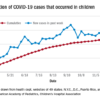Getting closer to an accurate early Alzheimer’s test
Scientists at Washington University in St. Louis have developed the most sensitive blood test yet for Alzheimer’s. In studies, the test identified patients with amyloid deposits, using mass spectrometry, before brain scans did.
Of course, amyloid is a normal brain protein; most people with amyloid deposits will not develop dementia, but it’s a significant risk factor. When blood amyloid levels are low, it may indicate it is clumping in the brain.
Researchers used mass spectrometry to test volunteers’ stored blood for beta amyloid, then checked if the levels predicted the results of PET scans. Mass spectrometry identified asymptomatic people accumulating beta amyloid in their brains when PET scans were still negative. The scans only showed beta amyloid in the brain years later. The blood test predicted the presence of plaque even in mostly asymptomatic people with 94% accuracy.
The test will not be available for clinical use for years, but prior to that it will be helpful to scientists conducting trials of drugs to prevent Alzheimer’s, seeking participants in the earliest stages of the disease.
Reference
1. Kolata G. A Blood Test for Alzheimer’s? It’s Coming, Scientists Report. New York Times. Aug. 1, 2019. https://www.nytimes.com/2019/08/01/health/alzheimers-blood-test.html.





